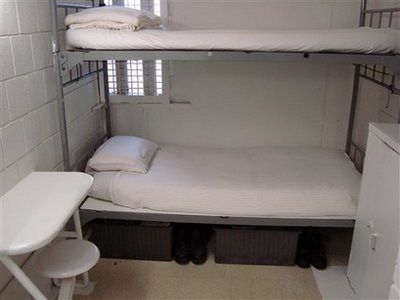
| Want to send this page or a link to a friend? Click on mail at the top of this window. |
More Special Reports |
| Posted August 6, 2009 |
| Do the Crime, Pay for the Time, as in $90 a Day |
 |
| This undated photo released by the Metropolitan Corrections Center shows a jail cell at the facility in New York. In New York, GOP Assemblyman James Tedisco introduced a bill that would charge wealthy criminals $90 a day for room and board at state prisons. Dubbed the 'Madoff Bill,' after billion-dollar Ponzi schemer Bernard Madoff, the legislation is designed to ease the $1 billion annual cost of incarcerating prisoners.(AP Photo/The Metropolitan Corrections Center) |
|
By DEBORAH HASTINGS |
|
AP National Writer |
| Wehaitians.com, the scholarly journal of democracy and human rights |
| More from wehaitians.com |